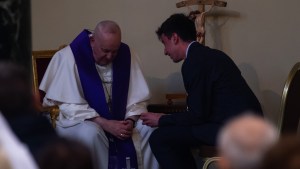The Gospel for this Sunday is John 20:19-31
1. A word of introduction
“It is My desire that Feast of Mercy be solemnly celebrated on the first Sunday after Easter. The soul that will go to Confession and receive Holy Communion shall obtain complete forgiveness of sins and punishment. On that day all the divine floodgates through which graces flow are opened,” said the Lord Jesus to St. Sister Faustina Kowalska, who recorded this in her Diary (No. 699).
Sunday’s Gospel reveals well the essence of this feast.
2. Keywords
Jesus said to them again, “Peace be with you.
As the Father has sent me, so I send you.”
And when he had said this, he breathed on them and said to them,
“Receive the Holy Spirit.
Whose sins you forgive are forgiven them,
and whose sins you retain are retained.”
The first task that Jesus gives to the disciples after his resurrection is to forgive sins. This continues today in the Sacrament of Reconciliation. It is a miracle. Jesus Himself told Sister Faustina:
“Write, speak of My mercy. Tell souls where they are to look for solace; that is, in the Tribunal of Mercy [the Sacrament of Reconciliation] […] Were a soul like a decaying corpse so that from a human standpoint, there would be no [hope of] restoration and everything would already be lost, it is not so with God. The miracle of Divine Mercy restores that soul in full.” (Diary, No. 1448).
These words of Jesus sound like fulfilled prophesies from the Book of Isaiah in the Old Testament:
“Though your sins be like scarlet, they may become white as snow; Though they be red like crimson, they may become white as wool “(Is 1:18).
The Hebrew word “rahamim” has two meanings. It means “mercy” as well as the “womb of a woman” in which a child develops before birth. For this reason, it is said that a person, after confession, is like a newborn.
When Jesus instituted the sacrament of Reconciliation, he “breathed on the disciples.” In the Bible, the image of God who “breathes on someone” means giving life to someone.
“The Lord God formed the man out of the dust of the ground and blew into his nostrils the breath of life, and the man became a living being,” we read in Genesis 2:7. The people who have received the grace of mercy are those who have received the breath of life in order to – as Pier Giorgio Frassati used to say – “to live, not to vegetate!”
3. Today
Jesus is the first to reach out to us but he has given us free will. It is up to us to decide how we use so many gifts.
So how will I live Mercy Sunday? How often do I receive the sacrament of Reconciliation? Do I want my family and friends to benefit from these graces as well?


